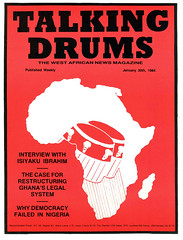Tribalism, civil war, corruption...
Ben Mensah
Ben Mensah continues his analysis on the Nigerian military take-over of December 31stMajor-General Muhammadu Buhari's motives for toppling Alhaji Shagari's civilian administration on December 31st, 1983 have been shrouded in the usually convenient charge of ineptitude on the part of the civilians.
But in spite of such accusations the declared desire of the Governor of Lagos State, Group Captain Gbolahan Mudashiru to pursue the former government's policy on education, health, housing and other schemes aimed at alleviating the suffering of the down-trodden masses demonstrate the fact that Shagari cannot be totally denigrated, how hard the military tries.
The fact that other governors who find themselves in similar circumstances have not made their views public may be due to mere reticence on their part as against Group Captain Gbolahan's exuberance as reflected in his declaration to permanent secretaries in the state civil service that the Jakande administration had a good plan which he endorses.
Even though a UPN governor, Mr Lateef Jakande formed part of the ousted civilian administration of Alhaji Shagari. The pity of it is that while he is currently being held in custody against his wishes his plans are going to be implemented by another group of people.
Without attempting to bore readers with the raison d'etre of military coups I dare question the competence of soldiers who take over power from civilians in West Africa.'
On October 1st, 1981 Alhaji Shehu Shagari, as President of the Federal Republic of Nigeria and commander in-chief of the armed forces, on the occasion of the twenty first anniversary of independence and second year anniversary of the Executive Presidency made a national day broadcast to review the country's history.
He said, "the first six years of post independence rule and even more so, the last six years of pre-independence rule, were characterised by ignorance and unfamiliarity, and therefore fear and mistrust among the various ethnic groups.
These pre-independence apprehensions and suspicious were carried out to our post-independence parliamentary democratic era. These facts persisted, indeed grew, despite the best efforts of many of the leaders of the government.
"The Federal government of which I was at that time a member and the regional governments finally came to grief with varying degrees of bloodshed, basically because of their fear and mistrust.
"During military rule, we witnessed the attempt at secession which culminated in a tragic civil war. Many lives were lost and much blood was shed."
That was the saga of the first republic and the military involvement to 'correct' what the civilians had done wrong, as told by ex-President Shehu Shagari who was appreciatively candid in his acknowledgement of their own human failures.
In 1983 however, it looks like the military themselves have too soon conceded their false move as can be concluded, again from the assertion of Group Captain Mudashiru, the new military governor for Lagos state that he considered his administration lucky in the sense that a very good foundation had been laid by ex-governor Jakande.
Even Head of State Gen. Buhari has revealed his other reasons for overthrowing Alhaji Shagari's government by admitting his ignorance of the State of Nigeria's economy and the lack of any realistic plan to remedy the situation. For in an address to his military governors he only told them to review the 1984 budget prepared by the ousted Shagari government and ensure that their reports contain more efficient management of resources. General Buhari expects these reports to be ready by the end of April.
However, having already disrupted a civilian administration Gen. Buhari has to plod on with charges of corruption, ineptitude, etc against the civilians. But again if history is a guide to the future then as varying degrees of bloodshed during the civilian era was transformed into a tragic civil war during the military era so will corruption and ineptitude of the Shagari regime degenerate into superlative proportions under Buhari's regime, thereby making the future bleak indeed for all Nigerians.
